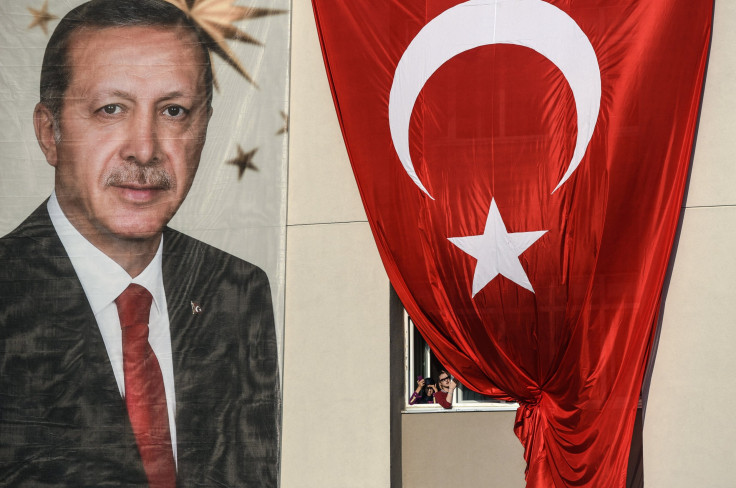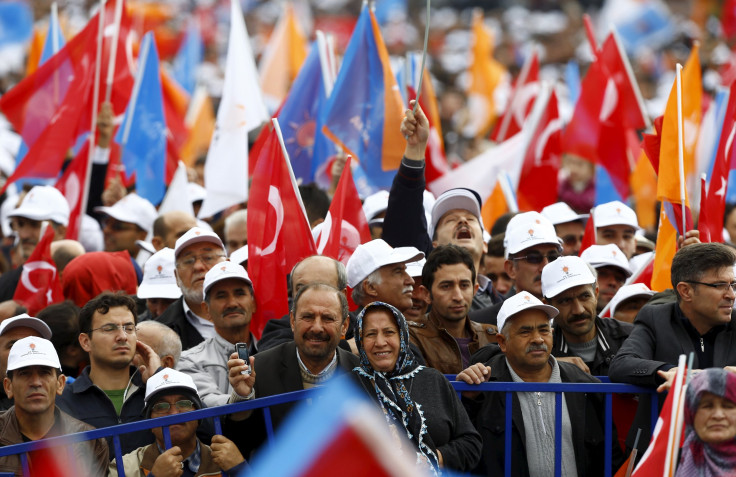Turkey Elections: Erdogan's Fate Hangs In The Balance As Divided Nation Goes To The Polls

Turkey went to the polls Sunday in the country’s second election in five months. The crucial parliamentary elections come at a time of a major political crisis in Turkey, and amid a growing security threat from militants of the Islamic State group.
In the previous -- and inconclusive -- election, held in June, the long-dominant Justice and Development Party (AKP) co-founded by President Recep Tayyip Erdogan failed to retain its majority in the 550-seat parliament. Erdogan’s efforts to obtain a decisive two-thirds majority were thwarted by the pro-Kurdish People’s Democratic Party (HDP), which managed to cross the 10 percent threshold needed to enter parliament.
“This election will be for continuity of stability and trust,” Erdogan reportedly said Saturday, vowing to respect the results. However, opinion polls have predicted that the outcome of Sunday’s elections is unlikely to be dramatically different from June, when AKP managed to secure only 40.9 percent of the votes cast.
“The political uncertainty, growing social divisions and insecurity that has characterized the period between the two elections seems set to continue,” Bulent Aliriza, director of the Turkey Project at the Washington-based think tank Center for Strategic and International Studies, said, in a statement.
In a country rife with sectarian and ethnic divisions -- with Kurds, Islamist and secular Turks at odds with each other -- Erdogan’s supporters have spoken out in favor of what is being perceived as an authoritarian streak in his style of governance.
“I believe the best way to maintain stability, economic success and to fight terror in this country is to vote for AK Party,” Ibrahim Yildirim, one of 54 million registered voters in the country, told the BBC. “They may not have done everything right. But they will learn from their mistakes.”

However, Erdogan's opponents and critics have been less charitable, and become increasingly wary of his efforts to curb dissent and crack down on rivals and media critical of his administration. Last week, Turkish police raided the headquarters of the media group Koza-Ipek, which is linked to the U.S.-based Islamist cleric Fethullah Gulen -- a vocal Erdogan critic.
Security is also a key issue in the elections. Over the past year, the country has witnessed frequent, and violent, attacks -- mainly from militants affiliated to ISIS. Last month, over 100 people were killed in explosions in the capital city of Ankara in an attack authorities attributed to ISIS.
For Sunday’s elections, over 250,000 police personnel have reportedly been deployed on the streets.
Concerns over continuing political instability and security have also hit Turkey's economy, which grew at a staggering pace of 9.2 percent in 2010. In 2015, it is expected to grow by 3 percent, according to the International Monetary Fund. And as tourists stay away from the troubled country, the Turkish lira has tumbled over 20 percent this year.
“Continued instability carries serious dangers for an economy highly dependent on the external financial environment and the constant influx of foreign funds,” Aliriza added, in the statement. “The precipitous depreciation of the Turkish currency, with all of its negative implications, definitely undercut the AKP’s ability to boast about its achievements and impacted its June vote.”
© Copyright IBTimes 2025. All rights reserved.






















